OC 52: London World City: Sustainable Growth?
Open to the world or open to all its citizens?
Despite double dip recession, or perhaps because of it, the development industry is lobbying hard to obtain government assistance – read tax payers’ money – to continue expanding macro-infrastructure, however much contested by many ordinary citizens.

1_Dia Heathrow London airport, third runway protest
Source: http://www.telegraph.co.uk/news/uknews/2058322/Heathrow-third-runway-Thousands-join-protest.html
Conventional wisdom points out that London is living on Victorian foresight and bold interventions in the capital of their empire. However, at present sewers are crumbling, hence the proposal for a massive tunnel along the Thames to deal with overflowing sewage and storm water, fresh water mains are bursting continuously and gas pipes are rusting through needing replacement, the underground system is out-dated and overcrowded, and information technology infrastructure limps behind cities throughout the world.
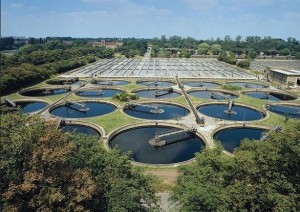
2_Dia UK ageing sewage plant -> London tideway project
Source: http://www.nce.co.uk/features/water/clear-solutions/8606410.article
Business wants direct flights to Asia and especially to fast growing cities throughout China, as well as to Brazil, the other Eldorado from where rich pickings are expected, ignoring the growing south-south trade relations. For that they want air traffic capacity in the South-East to compete with global airports throughout the ‘emerging’ economies, despite completely different conditions and fierce opposition by citizens.
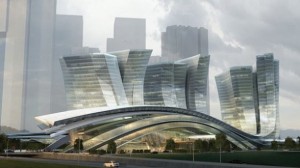
3_Dia Underground high speed railway station Aedas studio (project)
Source: http://paulchong.net/tag/hong-kong/
The North South divide has not died down either, so the rail industry wants high speed rail to expand to the second city Birmingham and further north at an unknown future date to Manchester and possibly Scotland. Within London, businesses and commuters press for a second crossrail to link the south west with the north east of the city.
Sustainable growth?
These ambitious projects raise many questions. How viable are these infrastructure schemes and from what point of view: financial investment or sustainable development? Who should finance them, who would carry the long term burden of debt, whom would they benefit and what else could that money buy? Whether sustainable growth is a contradiction in terms remains an unanswered dilemma. The Victorians had little concern for social and environmental impacts of their grand schemes.
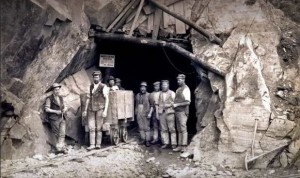
4_Dia Victorian Mega infrastructure ventures (aqueduct Manchester)
Source: http://menmedia.co.uk/manchestereveningnews/news/business/s/1492680_the-return-to-victorian-values-which-could-solve-britains-drought-crisis
What mattered was expanding their trade, increasing their returns on the transformation of materials from the colonies, maintaining their empire. Undoubtedly, their entrepreneurship had a lot of positive outcomes, not least technological advances and engineering prowess, while affirming their world power. Sanitation and quality of life improved notably with new utilities, but large amounts of residents were displaced in poorer areas to make way for railway stations, sidings and warehousing. Rail tracks and roads were driven through built up areas, leaving pollution and severance in their wake. Other cities have interfered equally brutally in their fabric, to name but Haussmann’s Paris, and Londoners benefit from these bold decisions today.

5_Dia Victorian spatial fixes: London Docklands, oversized from the outset
Source: http://iarchitectgroup.blogspot.co.uk/
Is this approach appropriate in the twenty first century and where does this leave the promises about mitigating adverse effects of climate change and caring for the environment of future generations?
Role of politics in macro-development
When civil servants, who are supposed to contribute professional expertise to decision making, carry out critical evaluation and act as custodians of cumulative memory seem to ignore anything that dates back more than five years, politicians can follow short term, often partisan interests, unhindered by facts or burdened by consequences of previous decisions.

6_Dia Cameron against Boris Johnson in London airport politics
Source: http://article.wn.com/view/2012/09/05/Cameron_Britain_to_Review_Its_Airport_Capacity_b/
How in these circumstances should decisions with very long term effects be taken and by whom? Considering the contradictory views of senior politicians in the same party, un-kept promises and numerous U-turns, citizens may well be right in demanding a greater say about their future.

7_Dia Green protest against Heathrow airport third runway, discarded by the government and rescued again contrary to their manifesto.
Source: http://yfweb.wordpress.com/2012/03/07/people-power-2012-in-tweets/
It is questionable whether lobbies should have a disproportionate influence by invoking jobs, mainly in the transient construction sector and not necessarily for local people. Equally, is it right to leave such decisions to directors who move from corporation to corporation? Not to speak about accountability for adverse consequences which tend to appear beyond the political cycle.
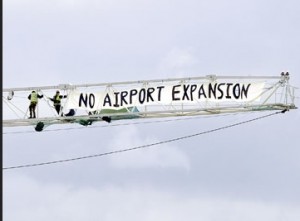
8_Dia ‘White’ protest against Heathrow third runway
Source: http://www.uxbridgegazette.co.uk/west-london-videos-pics/west-london-picture-galleries/2009/01/15/heathrow-third-runway-timeline-in-pictures-part-2-113046-22701127/
HS2 – High speed rail debate
The current debate about HS2, the high speed rail link planned from London to Birmingham is exercising the minds of lobbies and opponents alike. Ably chaired by Margaret Hodge MP who has made her mark as chair of the House of Commons public accounts committee, pro and con protagonists examined the value of HS2 in front of a packed audience of supporting lobbies and opposing residents at the Royal Society of Arts in October 2012.
http://www.neweconomics.org/events The key questions were what level of confidence was necessary to proceed with large and complex public investment and how to achieve such confidence; and whether HS2 was the best investment to resolve rail capacity constraints and rebalance Britain’s economic geography.
Sir John Armitt of Olympic Delivery Authority fame but who withdrew from heading London’s new legacy corporation pleaded for HS2 but without convincing objective arguments. Just let’s be bold, let’s do it was his message. Not surprisingly, Sir Richard Leese, leader of Manchester City Council was keen on HS2 which for him would solve the north south divide by giving Manchester the opportunity to compete with London’s financial might. Again naturally, Sarah Hayward, leader of Camden Council which would be most adversely affected by yet another breach through its urban fabric was opposed to the project. Pete Tyler from Cambridge university who researched the geography of austerity and analysed sectoral aspects of the British north-south divide was not convinced that HS2 would cure it, quite the reverse it may even disadvantage other regions as their rail connections would decline. Helen Kersley of the New Economic Foundation which initiated this debate provided some factual inputs from their widely drawn cost-benefit research of the proposal, including alternative options in response to the government consultation. http://www.neweconomics.org/publications/response-to-the-hs2-consultation
The key objections during the debate were that half the amount would suffice to upgrade the whole rail network linking London to the North, followed by the negative environmental impact of very high speed rail, besides disruption of central London fabric and communities and questionable location of the track and its connection to the existing HS1, airports and other strategic destinations.
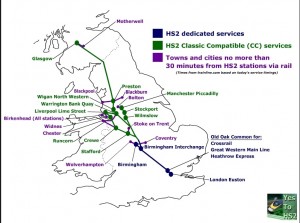
10_Dia One of the proposed HS2 tracks with imputed benefits.
Source: http://brunelsoldstation.wordpress.com/2012/01/13/hs2-fantasy-or-folly/

11_Dia Contested HS2 track with spur to Heathrow airport which entails large amounts of expensive tunnelling in London and assumes Heathrow to remain a global hub.
Source: http://www.bbc.co.uk/news/uk-politics-18815896

12_Dia Tunnelling engineering plan through landscape of outstanding beauty and of scientific interest.
Source: http://tunnellingjournal.com/news/hs2-launch-public-consultation/
The show must go on: Growth and Infrastructure Bill
No-one would think that there is an economic crisis when walking through London and observing all the holes in the ground, cranes in the sky, continuous stoppages of public mobility and streams of tourists. Does this justify a ‘Growth and Infrastructure Bill’, 2012,
http://services.parliament.uk/bills/2012-13/growthandinfrastructure.html
following on the footsteps of the Localism Act and the National Planning Policy Framework? Again, the justification is the need for the UK and especially London and its financial sector to compete on the world stage. The same reasons are invoked as ever, that the bill will cut red tape, speed up the planning system, stimulate business investment and create jobs, without much tangible evidence.
From a long term perspective, this just confirms UK’s centralist culture, despite rhetoric of localism and community self-determination. The Secretary of State, who incidentally has always kept the final say in planning legislation, can now be approached directly to grant planning consent above an ‘underperforming’ local authority, for ‘major applications’. These words are conveniently vague, and will no doubt make lawyers happy during disputes between interested parties.
The most sought after part of the development industry is open land, obtaining planning permission for much higher yielding use, without returning a share of this to the community nor the obligation to implement projects with planning consent, thus keeping scarcity afloat to protect returns on investment. What are the chances for the public realm, urban quality of life, open cities? How can local authorities, the organisations which are supposed to provide civic amenities hang on to their open spaces, let alone create new ones with further development?

13_Dia Relaxed quotas for affordable housing
Source: http://www.publicfinance.co.uk/news/2012/09/affordable-home-quotas-to-be-relaxed/
Most worryingly, affordable housing is undermined further. Any form of planning gain can be renegotiated, let alone waved for new housing which an increasing amount of Londoners cannot afford. The explanation is that housing schemes are stalled because of planning gain conditions, or amount of stipulated affordable housing, but other reasons may be more realistic. One of the issues is that housing associations which were supposed to provide affordable housing (meaning to be let at 80% of market rents, not affordable to many low paid workers) have become private enterprises competing with volume builders. However, the bill may well be fast tracked through parliament, and the housing situation may become even more precarious and unsustainable.
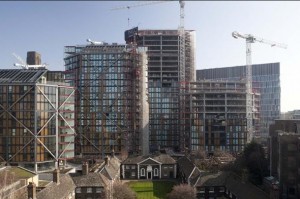
14_Dia Abandonment of affordable housing quota, even high density housing on less desirable sites
Source: http://www.architectsjournal.co.uk/news/daily-news/affordable-housing-removed-from-rogers-neo-bankside-scheme/8616372.article
